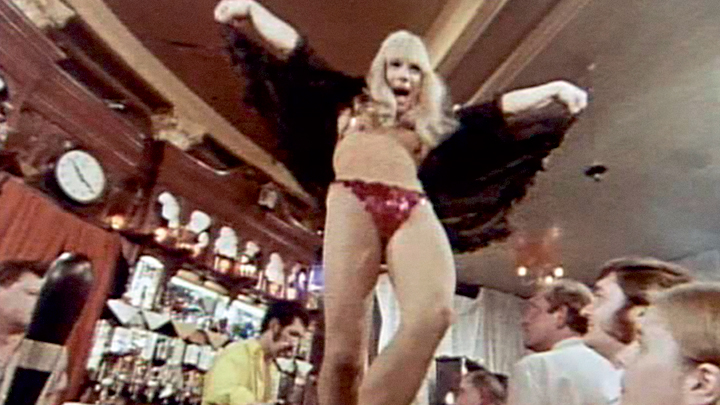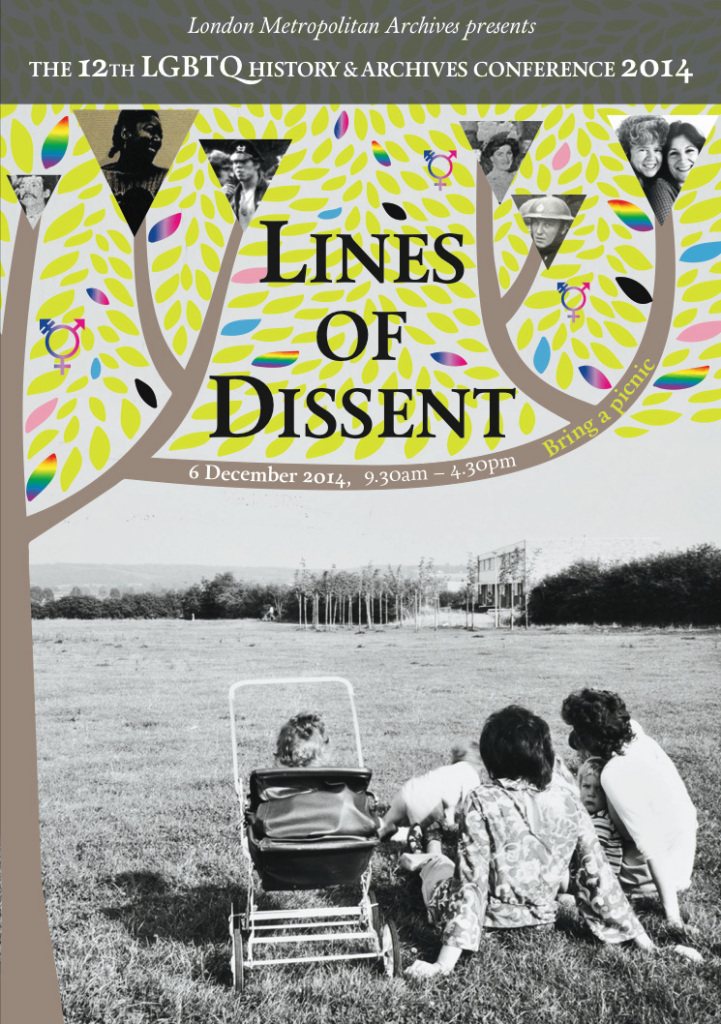Bulgarian Tendencies: Stories from the Queer Library of Jonathan Cutbill
October, 2020 · By Justin Bengry
In the 2020 Charles Holden Lecture, I examined the histories of books drawn from the vast and important LGBTQ collections of Jonathan Cutbill, recently donated to Senate House Library, and told the stories behind some dangerous queer books.
Even in the first decades of the twentieth century, Edward Carpenter’s, Rose Allatini’s, and Radclyffe Hall’s defenses of homogenic love, homosexuality, and sexual inversion illuminate the challenges encountered by authors and publishers whose trade included these subjects. But their books also illuminate how authors and publishers imagined potential queer markets for writings that promoted tolerance, understanding, and even advocated legal reform.
Haud Nominandum collection of over 30,000 LGBT+ books gifted to Senate House Library
In 2019, Senate House Library was gifted the remarkable collection of over 30,000 books and archives from Jonathan Cutbill, one of the founders of the Gay’s The Word Bookshop and a leading LGBT+ rights activist. The collection, which dates from 1760 to the 2010s, is now one of the largest and richest collections of queer literature in the UK.
In an interview for the BBC(Opens in new window), Maria Castrillo, Head of Special Collections and Engagement at Senate House Library, said the collection would help fill “fundamental gaps” in LGBT+ history. She added that the Library “recognises the unique qualities of the collection and would like to develop it” and hoped it would be a catalyst for research and community engagement.
You can read more about the history of queer publishing and the life and work of Jonathan Cutbill, in this Senate House Library blogpost.
Centre for Queer History
December, 2019 · By Justin Bengry

I have been founding director of the Goldsmiths Centre for Queer History since 2019. Our work includes the provision of the first MA in Queer History, public history events, workshops, and the creation of the Goldsmiths Archive of Queer Life Histories.
Interest in queer histories and the lives of LGBTQ people in the past crosses departments and disciplinary boundaries at Goldsmiths. Exciting and dynamic research is being undertaken not only in the Department of History but across the College.
Goldsmiths Queer History brings together students and staff at Goldsmiths and across the University of London. But we also engage with a wider public of community members, activists and heritage professionals who are engaged with questions of the queer past and who promote the value of sexual and gender diversity today. The study of queer history is as much about the present as the past.
You’re Dead to Me: LGBT History
September, 2019 · By Justin Bengry
The history podcast for people who don’t like history… and those who do. Greg Jenner brings together the best names in comedy and history to learn and laugh about the past.
Greg Jenner is the host of the smash hit BBC podcast series ‘You’re Dead To Me’, which pairs up top comedians with top historians to deliver funny, fascinating explorations of the most interesting subjects from global history. It debuted at Number 1 in the Apple Podcast Charts in 2019, was named among their Best of 2019, and is one of BBC Sounds’ flagship podcasts, with 27 million downloads in the first 18 months. Series 3 was shortlisted for the Listeners’ Choice Award at the British Podcast Awards 2021.
LGBT Hist0ry (Listen here)
From Molly Houses to secret diaries, discover the real-life stories that make up the history of the LGBT community. Greg Jenner is joined by comedian Suzie Ruffell and Dr Justin Bengry, historian and creator of the world’s first masters degree in Queer History. It’s history for people who don’t like history! Produced by Dan Morelle Scripted and researched by Emma Nagouse
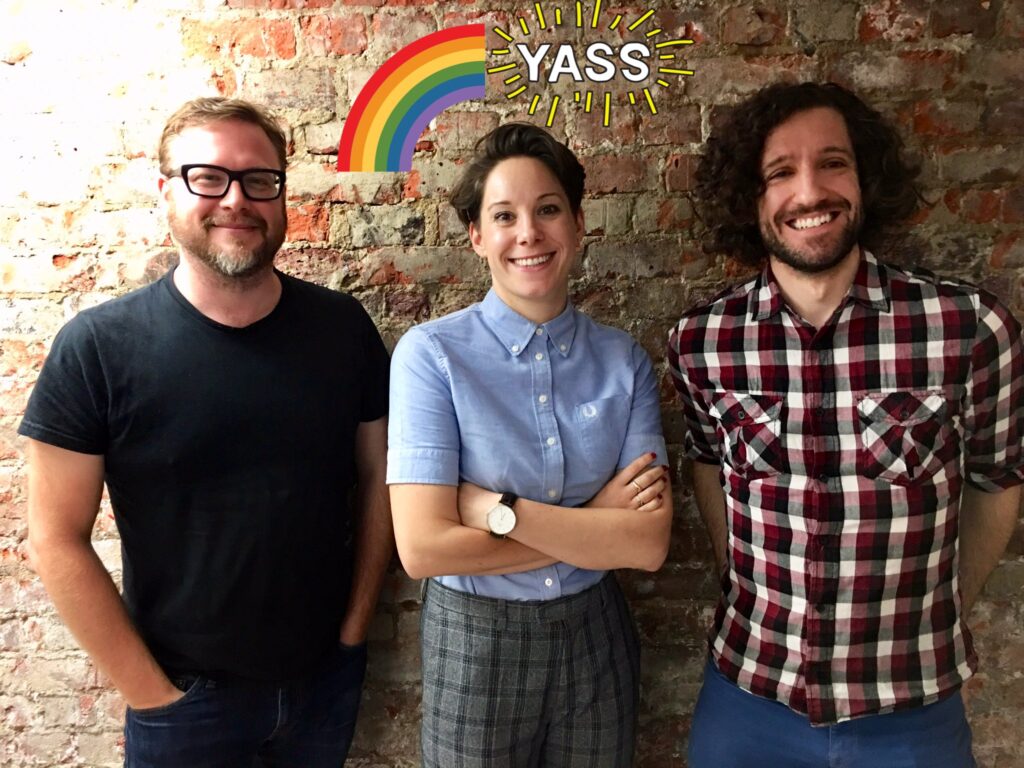
Convicted for Love
July, 2017 · By Justin Bengry
Homosexuality was only partly decriminalised in England and Wales in 1967. This documentary meets four of the many men who suffered criminal or medical discrimination in the last 50 years.
 To mark the 50th anniversary of the partial decriminalisation of homosexuality in England and Wales, Convicted for Love tells the dramatic and emotional story of four gay men who fell foul of Britain’s homophobic laws. The government’s 2017 Turing’s Law promises a pardon and an apology for men like these, who were hounded for their homosexuality. But this documentary reveals that, for many of them, the injustice continues. Fifty years ago, the 1967 Sexual Offences Act was hailed as a great step forward for gay rights. It gave the impression that it made all homosexuality legal for men. It didn’t. It only legalised sex in England and Wales between two men over the age of 21 – in private. It also didn’t mark the end of discrimination against gay men. Many aspects of their everyday lives remained illegal. In the following decades these men have had a long, hard struggle for their rights. Over 15,000 men were unfairly convicted of homosexual offences.
To mark the 50th anniversary of the partial decriminalisation of homosexuality in England and Wales, Convicted for Love tells the dramatic and emotional story of four gay men who fell foul of Britain’s homophobic laws. The government’s 2017 Turing’s Law promises a pardon and an apology for men like these, who were hounded for their homosexuality. But this documentary reveals that, for many of them, the injustice continues. Fifty years ago, the 1967 Sexual Offences Act was hailed as a great step forward for gay rights. It gave the impression that it made all homosexuality legal for men. It didn’t. It only legalised sex in England and Wales between two men over the age of 21 – in private. It also didn’t mark the end of discrimination against gay men. Many aspects of their everyday lives remained illegal. In the following decades these men have had a long, hard struggle for their rights. Over 15,000 men were unfairly convicted of homosexual offences.
I was a consultant on this documentary and for the accompanying book Not Guilty.
Dir: Steve Humphries. Testimony Films for Channel 4
Queer Beyond London: Sexualities and Localities
January, 2016 · By Justin Bengry
Queer beyond London is an AHRC-funded collaboration between Birkbeck College, University of London and Leeds Beckett University to research histories of sexual identities and communities in Leeds, Plymouth, Brighton and Manchester since c.1965.
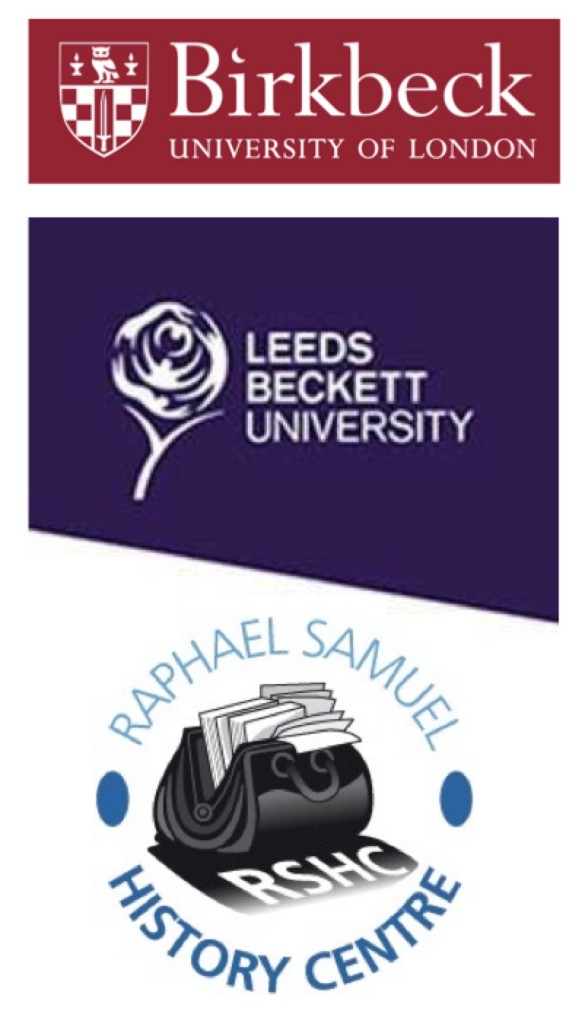 Queer Beyond London is the first sustained, contextualised and comparative historical investigation of the local impact of changing cultural attitudes and official policies concerning sexuality, and the first to look at the particularities of lesbian, gay or other queer lives in cities with different subcultural associations and reputations. The project reveals the factors which have modulated queer lives and cultures of rejection, toleration or acceptance in these places and elsewhere. It will contribute to debates about the intersection of sexual and other categories of identity and identification, and about conceptions of community, belonging and cultural change. Crucially it will also feed a broader appetite for accounts of the lesbian, gay and queer past and interrogate the individual, community and political implications of that appetite. The project will bridge a gap between ‘popular’ and ‘academic’ LGBT or queer histories, and draw attention to local and national resources, archives, community projects and on-line resources – including at least six HLF-funded LGBT community history projects. It will also garner new testimonies relating in particular to the local impact of those projects on ideas of identity and community.
Queer Beyond London is the first sustained, contextualised and comparative historical investigation of the local impact of changing cultural attitudes and official policies concerning sexuality, and the first to look at the particularities of lesbian, gay or other queer lives in cities with different subcultural associations and reputations. The project reveals the factors which have modulated queer lives and cultures of rejection, toleration or acceptance in these places and elsewhere. It will contribute to debates about the intersection of sexual and other categories of identity and identification, and about conceptions of community, belonging and cultural change. Crucially it will also feed a broader appetite for accounts of the lesbian, gay and queer past and interrogate the individual, community and political implications of that appetite. The project will bridge a gap between ‘popular’ and ‘academic’ LGBT or queer histories, and draw attention to local and national resources, archives, community projects and on-line resources – including at least six HLF-funded LGBT community history projects. It will also garner new testimonies relating in particular to the local impact of those projects on ideas of identity and community.
Learn more about Queer Beyond London, or stay informed about events in our partner cities at Facebook: QueerBeyondLondon or Twitter @QueerBeyondLDN
London’s Vanishing Queer Spaces
July, 2015 · By Justin Bengry
On August 12, 2015 I was invited to the British Film Institute to discuss the vanishing queer spaces of London. The event sold out on the first day that tickets were available.
Queer lives have always been less visible for historians, but valuable filmic fragments documenting London’s LGBT communities do survive, as we’ll see in this special event. BFI National Archive curator Simon McCallum will present fabulous rarely-seen footage, including a recently rediscovered record of 60s drag at the Royal Vauxhall Tavern and Derek Jarman’s videotape tour of long-gone club Benjy’s. He will be joined onstage by a panel to reflect on the footage, and share concerns for the future. The panel will include Justin Bengry (writer and historian, Project Researcher on Pride of Place: England’s LGBTQ Heritage), Tamsin Bookey (archivist, DJ and co-founder of Unskinny Bop), Simon McCallum (BFI National Archive), and Ben Walters (critic and member of RVT Future campaign).
Wednesday 12 August 2015 18:10 | Total run time c.120 min | NFT3
See also Wotever @ BFI and LGBT Young Londoners
Pride of Place: England’s LGBTQ Heritage
June, 2015 · By Justin Bengry
Pride of Place is a collaborative initiative between Leeds Beckett University and Historic England (formerly English Heritage) to uncover and celebrate England’s lesbian, gay, bisexual, transgender and queer (LGBTQ) history through its buildings and spaces.
Lesbian, gay, bisexual, transgender and queer (LGBTQ) histories and heritage are everywhere. Pride of Place identifies the locations and landscapes associated with England’s LGBTQ heritage through innovative crowd sourcing and mapping techniques. Pride of Place aims to uncover new locations associated with England’s LGBTQ past, and to revisit existing heritage sites to consider their LGBTQ significance. These include, most obviously, places of LGBTQ social interaction, political action and community organisation, but sites of LGBTQ heritage are not limited to these. They may also include homes and domestic spaces once lived in by ‘queer’ people as well as buildings and interiors created by LGBTQ designers and architects, locations which may themselves hold ‘queer’ resonances. Pride of Place recognises that our LGBTQ heritage needs to be identified, recorded, understood, cared-for, and celebrated, as part of our national identity.
Project Researcher
 As Project Researcher on this major digital and public history project, I was responsible for historical research, writing and advising on policy, developing crowd sourcing techniques, mapping historical data and building partnerships with LGBTQ heritage and community groups. I designed innovative crowd-sourcing techniques to engage the public in identifying significant sites of LGBTQ heritage on the project’s interactive map. As the first initiative by Historic England to uncover and celebrate LGBTQ histories, this project brought unprecedented awareness of LGBTQ heritage to the widest public by embedding it in the shared story of England’s built environment.
As Project Researcher on this major digital and public history project, I was responsible for historical research, writing and advising on policy, developing crowd sourcing techniques, mapping historical data and building partnerships with LGBTQ heritage and community groups. I designed innovative crowd-sourcing techniques to engage the public in identifying significant sites of LGBTQ heritage on the project’s interactive map. As the first initiative by Historic England to uncover and celebrate LGBTQ histories, this project brought unprecedented awareness of LGBTQ heritage to the widest public by embedding it in the shared story of England’s built environment.
Pride of Place was announced on June 30, 2015 and has been widely reported on in both the mainstream press, including in the Independent and the New York Times, and also in the LGBTQ press, including in DIVA Magazine and attitude.
Pride of Place was launched on September 23, 2016, at which time it was reported in all major UK newspapers, the international media, the LGBTQ press, radio, television and many local media outlets. Major coverage included The Guardian, The Times, The Telegraph, New York Times and BBC News.
Coverage also appeared in:
- National print and online press: Daily Mail, Guardian Online, Daily Mail Online, Daily Mirror Online, Daily Express Online, Reuters UK, The Architects’ Journal
- LGBTQ press: Outfront, Gay Times, Pink News, Attitude
- Local media: Bristol Post, Get West London, Newmarket Journal, Bedford Today, Fenland Citizen, Artlyst, Spenborough Guardian, Malton and Pickering Mercury, Brighouse Echo, Halifax Courier
- Radio: BBC World Service, BBC Radio London, BBC Radio 5 Live, London Live
Mapping for Justice
June, 2015 · By Justin Bengry
On 2 June 2015, I was an invited panellist talking about crowd sourcing and participatory mapping at ‘Mapping for Justice: Engaging Our Geographical Imaginations and Using the Power of Maps in Struggles for Social Change’
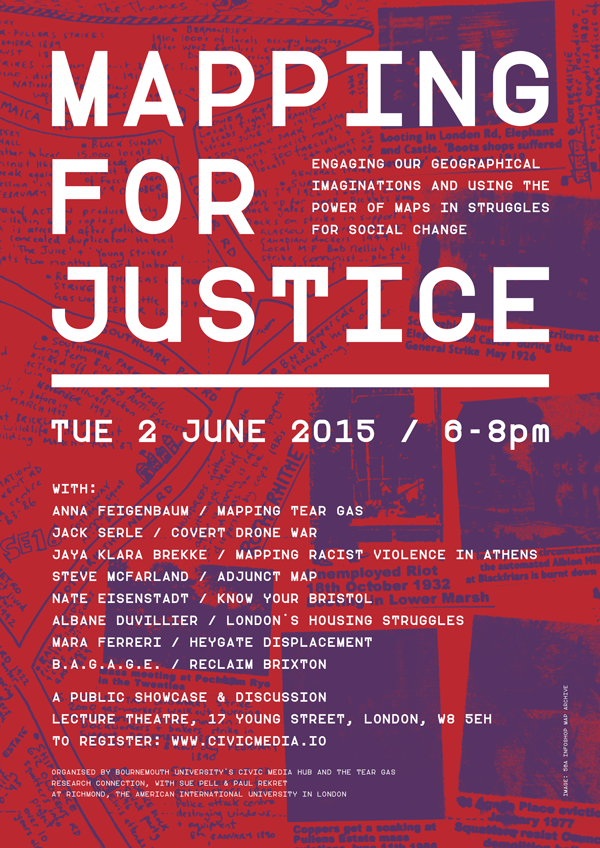 From drone strikes to racist attacks, from precarious labour to gentrification, how do maps help us understand injustice and illuminate struggle?
From drone strikes to racist attacks, from precarious labour to gentrification, how do maps help us understand injustice and illuminate struggle?
In this public showcase and discussion we explore how mapmakers engage our geographical imaginations and use the power of maps for social change. From oral history to twitter data-mining, our featured mapmakers use a variety of techniques to make injustice visible. Whether made with paper and pen or on open source platforms, maps can give way to new tactics and strategies for intervention.
This event was organised by Bournemouth University’s Civic Media Hub and The Tear Gas Research Connection, with Sue Pell & Paul Rekret at Richmond, The American International University in London
A Public Showcase & Discussion
2 June 2015, 6-8pm
Lecture Theatre, 17 Young Street, London, W8 5EH
Queer Inheritances Workshops at the Lines of Dissent Conference
December, 2014 · By Justin Bengry
With Amy Tooth Murphy, I co-curated the morning sessions of The 12th LGBTQ History & Archives Conference 2014 at the London Metropolitan Archives.
We took as our theme ‘Queer Inheritances’ and the range of sources that might help to better understand queer lives. The conference was attended by 150-200 people and the workshops were a notable success drawing up to 25 people each to 3 workshops running twice across the morning.
Queer Inheritances:
“Discovering a box of mementoes, photos and other items that document a queer life can offer as many questions as answers about a friend, loved one, or even a stranger. What did they value? Who did they love? Who loved them? Why were some objects worth preserving and what can they tell us? Uncovering these ‘queer inheritances’, however, might only partially illuminate a past life and, in fact, might also help us to reflect on our own present.We bring to bear our own preconceptions, expectations and desires when reading past queer lives. In this workshop participants will examine queer inheritances to piece together the contours of lives based on a wide range of personal objects gathered together and preserved but also reflect on what we bring to understanding the queer past.”
About the Conference:
The twelfth annual Lesbian, Gay, Bisexual, Trans and Queer History and Archives conference embraces the fascinating and complex world of LGBTQ family history and genealogy. A mix of talks, workshops and creative activities will help us to explore, reconstruct and reimagine the ways in which ideas of LGBTQ family are defined and understood.
After a keynote address by Daniel Monk (Birkbeck) on the perils and pleasures of queer wills, morning workshops included hands-on encounters with historical sources, which participants used to piece together a past life and were facilitated by Heike Bauer (Birkbeck), Julia Laite (Birkbeck) and Brent Pilkey (UCL). A blog post by Claire Hayward describing the conference appeared at Notches history of sexuality blog.
London Metropolitan Archives (LMA) is the largest local authority record office in the UK, covering the City and Greater London, LMA hold books, documents, photographs, maps and drawings dating from 1067 to the present day.
First National Festival of LGBT History
October, 2014 · By Justin Bengry
In 2014 I was invited to be a member of the committee organising the academic conference to accompany the First National Festival of LGBT History in Manchester in February 2015.
The 2nd What is and how to do LGBT History Conference 2015
Methods, Subjects & Approaches
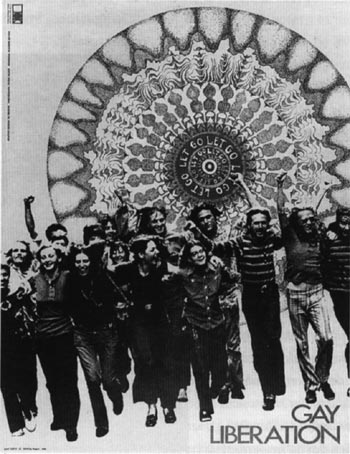 “The 2nd What is & How to DO LGBT History?” conference seeks to place attitudes, experiences and identities in their historical context. Despite the increasing popular demand for “LGBT History” in Britain, the history of attitudes towards sex and gender diversity in the UK remains an underdeveloped field, especially in comparison with the advances that have been made in the United States. An important part of the 10th anniversary celebrations of LGBT History month is to lead and develop the growing discourse into past attitudes towards sex and gender diversity within the academy and among the general public.
“The 2nd What is & How to DO LGBT History?” conference seeks to place attitudes, experiences and identities in their historical context. Despite the increasing popular demand for “LGBT History” in Britain, the history of attitudes towards sex and gender diversity in the UK remains an underdeveloped field, especially in comparison with the advances that have been made in the United States. An important part of the 10th anniversary celebrations of LGBT History month is to lead and develop the growing discourse into past attitudes towards sex and gender diversity within the academy and among the general public.

